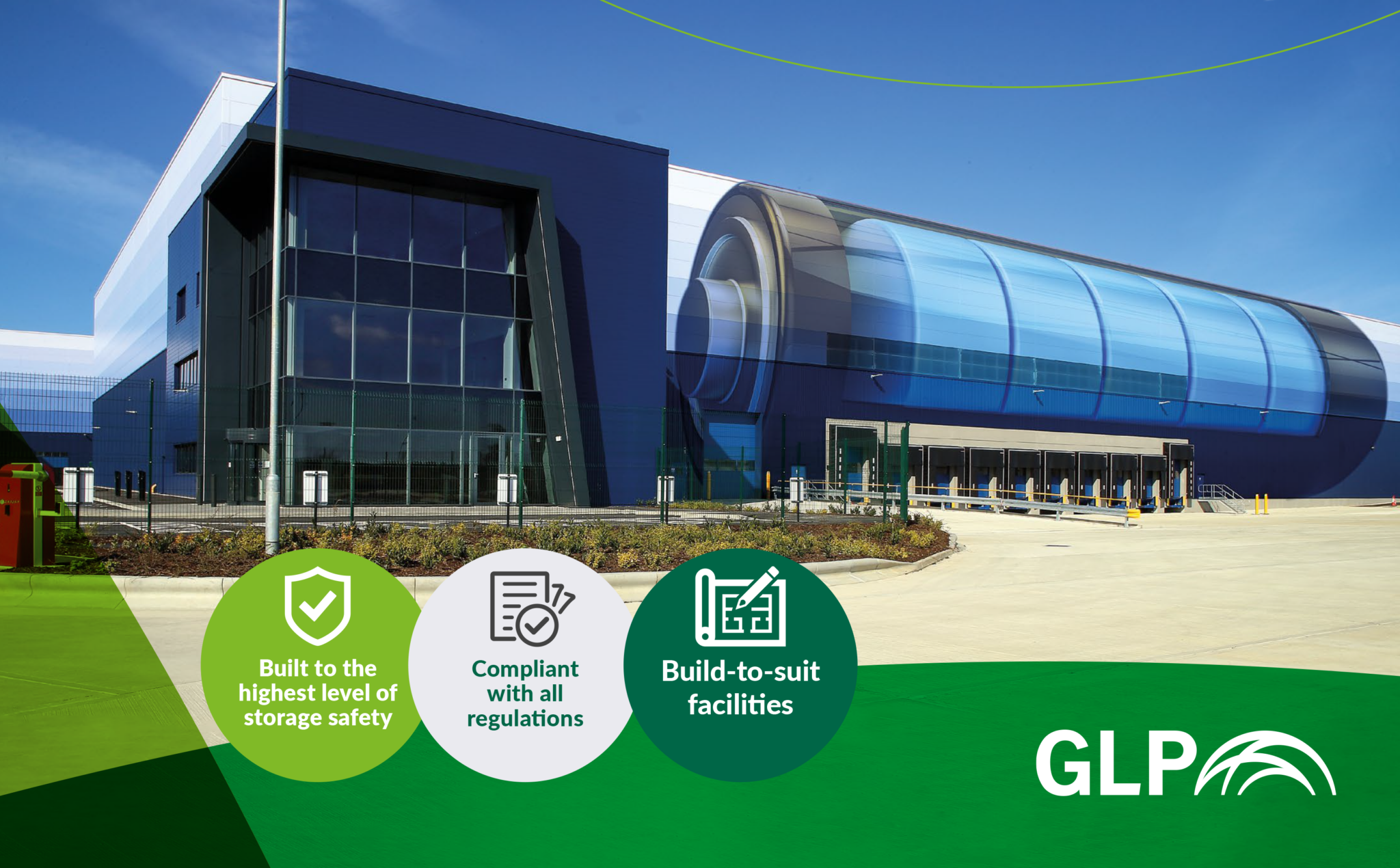In recent years, the world has witnessed an electric vehicle (EV) revolution, as individuals and industries alike shift towards greener transportation solutions.
The electrification of the fleets of giants such as Amazon is indicative of the direction that others will take. Central to this movement is the remarkable rise in the demand for lithium-ion batteries, the heart of EV technology. These batteries can be volatile, so it is essential to ensure the safe battery storage is available to prevent unwanted harm.
As a result, there is an increasing need to be ensuring safe storage facilities exist to meet the surging demand for these sensitive products. It is vital to explore the challenges and crucial aspects of battery storage that need to be considered when creating these new facilities; highlighting the comprehensive safety approach adopted by GLP towards this important resource may be useful in defining best practice.
The Driving Force: Demand for Electric Vehicles
Electric vehicles have transformed the automotive landscape, offering eco-friendly alternatives to traditional gas-powered cars. While still relatively expensive, the technology is only going to become more accessible. This transition is driven by a collective awareness of the environmental impact of fossil fuels and a desire to reduce greenhouse gas emissions, one of the main contributors to climate change.
As the adoption of EVs continues to soar, there is a proportional surge in demand for lithium-ion batteries, the core energy storage solution that powers these vehicles. Consequently, the need for efficient and secure battery storage facilities becomes paramount.

Dangers of Mishandling or Improper Battery Storage
The mishandling or improper storage of lithium-ion batteries can, however, have severe consequences, ranging from financial losses to potential harm to human life and the environment. If batteries are damaged, charged improperly, or exposed to high temperatures, they may catch fire or even explode, leading to significant property damage and risking the lives of individuals in the vicinity.
Lithium-ion batteries also contain toxic chemicals that, if leaked, can contaminate soil and water sources, posing health risks to nearby communities and ecosystems. Inadequate storage practices are not just inefficient, they may lead to the improper disposal of batteries, contributing to electronic waste and harm the local environment.
Readying Premises for Sensitive Products
Creating safe battery storage facilities is not without its challenges. The sensitive nature of lithium-ion batteries demands stringent safety protocols and infrastructure adaptations. One significant hurdle lies in repurposing existing warehouses or establishing new facilities to accommodate these requirements.
Lithium-ion batteries can generate considerable heat, making proper ventilation and cooling systems vital to prevent overheating and potential hazards. In the event of a battery malfunction, the risk of fire increases. Implementing advanced fire suppression systems is essential to minimize potential damage and ensure swift response in case of emergencies.
Battery storage facilities need to be equipped with appropriate electrical systems to handle the high energy demands of charging and discharging batteries safely. Finally, meeting safety regulations and environmental standards is of utmost importance to ensure smooth operations and reduce legal liabilities.

Our Comprehensive Approach to Safe Battery Storage
As a leading provider of logistics real estate, we recognize the critical importance of ensuring the safety of our facilities and have a proven track record of providing the highest levels of quality. Our commitment to safeguarding these sensitive new products is demonstrated through our comprehensive safety approach.
We invest in cutting-edge infrastructure, including advanced ventilation, cooling, and fire suppression systems, to create an environment that minimizes potential risks. Our facilities strictly comply with safety regulations and environmental standards, ensuring that all necessary permits and approvals are obtained.
Our team undergoes extensive training to handle and manage battery storage effectively, covering aspects such as emergency response, hazard identification, and safe handling procedures. Regular inspections and maintenance checks are conducted to identify and address any potential risks proactively.
We promote responsible disposal and recycling of lithium-ion batteries to minimize their impact on the environment and prevent e-waste pollution.
Meeting Future Needs
The rising demand for electric vehicles has undoubtedly brought about a surge in the need for safe battery storage facilities.
As the world moves towards greener energy solutions, ensuring the proper storage and handling of lithium-ion batteries is paramount to protect human lives, property, and the environment.
At GLP, we take pride in our proven track record of providing comprehensive safety measures and state-of-the-art infrastructure, setting the standard for secure and reliable battery storage in the logistics industry.
By embracing the EV revolution responsibly, we are actively contributing to a sustainable and cleaner future for generations to come.
If you want to learn more about our specific approach to battery storage, click here.